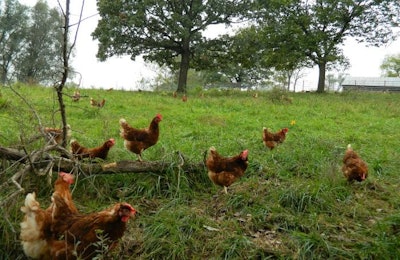
A Missouri-based farming cooperative is quickly becoming a leader in the fast-growing organic egg business. Its leaders say its specialty egg business is more about preserving a way of life than anything else.
Mid-States Specialty Eggs, based in Smithton, Missouri, was founded in 2008 by Marion Hostetler and Dale Shrock. Hostetler and Shrock, both Mennonites, were formerly contract turkey growers. Hostetler said he and his partner were concerned about the amount of growth promoting antibiotics used in the rations their flocks were fed and they no longer felt comfortable eating the meat they produced.
Looking elsewhere in poultry, the pair started to raise hens to produce organic eggs and found many others in their religious community interested in joining them.
“That’s the basis of our culture, the family farm or the home-based business,” Hostetler said. “So it was important for us to provide something for our group that would provide a home-based, farm-based business.”
A network of family farms
Since 2008, the operation has grown from Shrock and Hostetler’s farms to 162 farms located in Missouri and Arkansas, with a collective 4.23 million laying hens under the Mid-States umbrella. The combined flocks would rank Mid-States among the top 25 largest egg producers in the country, according to Egg Industry’s annual ranking of egg producers.
Each farm includes about 25,000 birds and is run by a Mennonite, or Amish, family. The hens are housed in a cage-free barn employing a floor, or nest-and-slat, housing system. Eggs are collected by a belt system, packed in crates on site, refrigerated and collected by Mid-States to be packaged for retailers.

All hens raised in Mid-States Specialty Eggs' cooperative are cage-free, and housed in barns using a floor, or nest-and-slat, system. The hens can enter and exit the barn freely through small doors. | Austin Alonzo
Every hen can go outside, by way of doors on the side of the barn, into a fenced-off pasture area. All birds are antibiotic-free and fed a vegetarian diet supplemented with probiotics and other organic feed additives.
The families managing the layer houses use the egg business as their primary income source. Hostetler and Shrock estimated a family of four to eight puts in about 4 or 5 hours of work daily to manage the birds and collect the eggs. In total, Hostetler estimated, about 900 people – the contract egg farmers and their families – are involved with the egg business.
The individual egg farms work on a three-year contract where Mid-States purchases their eggs on cost-plus basis. The egg farmers own the farm and its infrastructure and purchase the feed.
Selling organic eggs
The company, certified by the American Humane Association’s American Humane Certified program, produces cage-free, free-range, pasture-raised and non-GMO eggs as well as organic eggs. About ninety percent of Mid-States’ shell eggs are sold at major, nationwide retailers under their private labels and, in some instances, as Eggland’s Best in 49 US states. Hostetler said only about 10 percent are sold under Mid-States’ own brand name, Contented Hen. Its eggs are packed in its Smithton, Missouri, and Berryville, Arkansas, egg packing plants.
Mid-States’ eggs are marketed by Eggs “R” Us Inc., a Knob Noster, Missouri, egg marketing business that’s worked with Mid-States since 2008.
Bill Schroeder, Eggs “R” Us’ president, said he’s been in the egg business for 46 years and he’s used his relationships in the industry to help Mid-States build its business around the country. He said he saw how Mid-States was raising the animals and agreed that’s the best way to care for the birds and produce specialty eggs.

Bill Schroeder, Eggs "R" Us president, worked in the commodity egg industry for decades before moving into the specialty egg business. He said he believes in the organic product and the animal welfare practices behind it. | Austin Alonzo
Nicolas Henson, a spokesman for Eggs “R” Us, explained his company works as a sales and marketing extension of Mid-States. Eggs “R” Us buys eggs from Mid-States and sells them to customers. Additionally, Henson said, Eggs “R” Us carries contracts on production so farmers can secure funding from a bank. The company also provides additional services for Mid-States such as carrying product liability insurance for the eggs.
As of May 2017, Henson said, Mid-States’ Contented Hen-brand organic eggs sell for $3.99 a dozen at retailers like Sam’s Club and Costco. It’s a premium price compared with cheaper conventionally raised eggs. Schroeder said the eggs’ buyers value the absence of pesticides, chemicals and genetically modified organisms in the organic product. Outside access is seen as an animal welfare benefit and consumers value it enough to pay a premium. The commodity egg market’s strength or weakness can have an effect on the business – Hostetler said he understands how consumers will choose the cheaper product – but overall, there is some insulation from the ups and downs of the egg market thanks to a committed organic buyer who will consistently choose the product, Schroeder said.
Visions for the future of Mid-States
The key goal for the business is to continue to grow the organic business. A number of farmers are still working on a cage-free contract and as those contracts expire, the farms will be upgraded to organic-certified operations, Hostetler and Schroeder said.
The business is growing and there continues to be high interest in the religious community to work with Mid-States. The leaders didn’t want to cap their growth potential, but the further expansion of the contract farming network and the business depends on the size of the community. Hostetler said there’s still real potential for growth, however. The company was building onto its Smithton, Missouri, egg packing operation when Egg Industry visited in February, but doesn’t have any additional plans to expand its packing operations.

Mid-States Specialty Eggs' products are mostly marketed under another private retailer's brand name, but it does sell its own branded eggs as "Contented Hen." | Austin Alonzo
Because of their background, Mid-States owners said the idea is not to be the biggest producer or make a bunch of money, but rather to continue to provide a source of income and livelihood for their community.
“Our ambitions aren’t to be the biggest producer out there, our ambitions are aimed at our farmers; providing our farmers with a sustainable opportunity,” Hostetler said. “This is our life. This is our families’ farms’ life. We’re in it for that.”
Mid-States weighs in on USDA’s organic animal welfare standards rule
A new final rule establishing stricter animal welfare standards for the US Department of Agriculture’s National Organic Program are being delayed until at least November 2017, but Mid-States and Eggs “R” Us argue the final rule – originally published in January 2017 – won’t hamper the organic egg business or send prices skyrocketing as some are predicting.
When in effect, the new rules will require all organic-certified animals to be given enough space to lay down, turn around, stand up, fully stretch their limbs without touching other animals or the side of the enclosure, and otherwise express natural behaviors. The regulation will establish new rules for housing, transportation and slaughter of organic poultry, too. Most importantly for egg producers outside access will be mandatory. Verandas or porches attached to layer houses will no longer be classified as outdoor spaces.
Marion Hostetler, an owner of Mid-States Specialty Egg and a member of the Organic Egg Farmers of America, said his company is currently exceeding this new standard and it’s doing it at a cost where it can sell at a price that beats other major producers. He estimated the size of the organic layer flock is about 15 million to 17 million birds. If 7 million of those birds were taken out of organic production due to the rule, as he said the rule could potentially do, then there could certainly be a market disruption. But in the long term the market will even out. Even if prices spike, he said, it’s not likely organic eggs will enter the $8 a dozen territory.
The provision is unpopular with major animal agriculture organizations like the National Chicken Council and National Pork Producers Council. When the rule was initially announced, the United Egg Producers expressed displeasure.
“We had strong concerns over provisions related to outdoor access and the potentially significant – and prohibitive – cost implications of those changes on organic egg farmers,” David Inall, UEP senior vice president, said in a statement. “UEP is disappointed that long-accepted means of providing outdoor access, which are consistent with animal health, animal welfare and food safety, are being disallowed by this rule.”
Bill Schroeder, president of Mid-States’ egg marketing partner Eggs “R” Us Inc., said he believes an organic egg should be produced in a natural setting, not on a fenced in porch that does not give true outdoor access to the birds. He also dismissed the argument that organic egg production is more susceptible to disease, like avian influenza. He said Mid-States farms were as close as 12 miles to outbreaks of avian influenza during the massive 2014-2015 outbreak, but the birds were never infected. To the contrary, Schroeder and Hostetler said they believe outdoor access makes for a healthier bird.

















